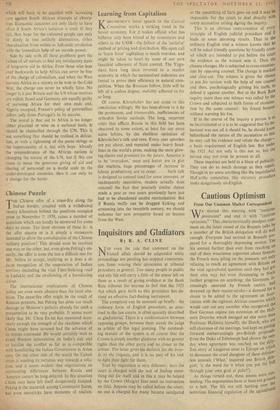Learning from Capitalism
KHRUSHCHEV'S latest speech to the Central Committee marks a striking trend in the Soviet economy. For it makes official what has hitherto only been hinted at by economists and others in the USSR--the failure of the 'socialist' method of pricing and distribution. His open call to 'learn from' capitalism is much overdue. and might be taken to heart by some of our own fanatiCal adherents of State control. The Yugo- slays have lung since reverted to a market economy in which the nationalised industries are forced to prove their efficiency in natural com- petition. When the Russians follow, little will be left of a useless dogma, mulishly adhered to for so long.
Of course, Khrushchev has not come to this conclusion willingly. He has been driven to it by the permanent, and irremovable, inefficiencies of orthodox Soviet methods. The long, recurrent crisis that afflicts Russia in this field has been obscured to some extent, at least for our more naïve leftists, by the ebullient optimism of Khrushchev's talk and tone. Every year speeches are put about, and repeated under heavy head- lines in the world's press, making the most glow- ing claims and promises for the future. America is to be 'overtaken,' meat and butter are to glut the markets, huge percentages of increase in labour productivity are to occur. . . . Such talk is designed to conceal (and for some innocent, or inadequately inquisitive, readers actually does conceal) the fact that precisely similar claims made a year or two years previously have just had to be abandoned amidst recrimination. But if Russia really can be dragged kicking and screaming into the twentieth century, we should welcome her new prosperity based on lessons from the West.










































































 Previous page
Previous page